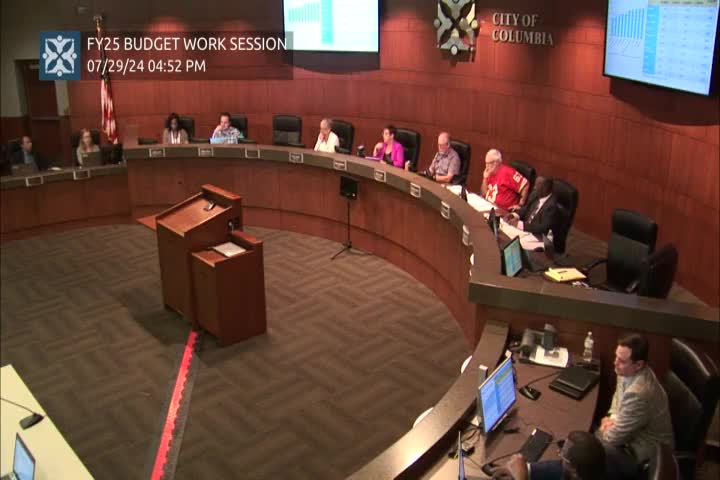Water Rate Increase Proposal Sparks Community Debate
July 29, 2024 | Columbia, Boone County, Missouri
This article was created by AI summarizing key points discussed. AI makes mistakes, so for full details and context, please refer to the video of the full meeting. Please report any errors so we can fix them. Report an error »

In a recent government meeting, officials discussed a comprehensive rate analysis for water services, emphasizing the importance of informed decision-making regarding potential rate increases. The analysis, which compares local water costs with similar cities, is nearing completion and will be shared with council members shortly.
The proposed rate adjustments include a 4% increase for both residential and commercial tier 1 users, a reduction from earlier proposals of 14% and 4.5%, respectively. This incremental approach aims to avoid sudden spikes in costs for consumers. Officials noted that while this year’s increase is a necessary first step, further adjustments may be required in subsequent years, specifically in 2026, 2027, and 2028, to ensure long-term financial health for the water fund.
The council also discussed the need for a standardized rate adjustment mechanism tied to the Consumer Price Index (CPI), which would allow for predictable annual increases without requiring annual council approval. This proposal aims to streamline the process and provide residents with clearer expectations regarding future rate changes.
Additionally, the Water and Light Advisory Board is examining water affordability metrics, particularly for low-income residents. A cost of service study is planned, pending budget approval, to assess how utility bills impact household finances. This study will utilize methodologies from the Missouri Public Utilities Association to evaluate the burden of water costs relative to income.
Communication with residents about the proposed rate changes has been prioritized, with a phased approach to inform customers about public input opportunities and potential impacts on their bills. If approved, the new rates would take effect on October 1, coinciding with the first billing cycle of the month.
Overall, the discussions reflect a commitment to balancing necessary funding for water services while considering the financial impact on residents, particularly those with lower incomes. The forthcoming report is expected to provide further insights into the local water rates compared to peer communities, aiding in future decision-making.
The proposed rate adjustments include a 4% increase for both residential and commercial tier 1 users, a reduction from earlier proposals of 14% and 4.5%, respectively. This incremental approach aims to avoid sudden spikes in costs for consumers. Officials noted that while this year’s increase is a necessary first step, further adjustments may be required in subsequent years, specifically in 2026, 2027, and 2028, to ensure long-term financial health for the water fund.
The council also discussed the need for a standardized rate adjustment mechanism tied to the Consumer Price Index (CPI), which would allow for predictable annual increases without requiring annual council approval. This proposal aims to streamline the process and provide residents with clearer expectations regarding future rate changes.
Additionally, the Water and Light Advisory Board is examining water affordability metrics, particularly for low-income residents. A cost of service study is planned, pending budget approval, to assess how utility bills impact household finances. This study will utilize methodologies from the Missouri Public Utilities Association to evaluate the burden of water costs relative to income.
Communication with residents about the proposed rate changes has been prioritized, with a phased approach to inform customers about public input opportunities and potential impacts on their bills. If approved, the new rates would take effect on October 1, coinciding with the first billing cycle of the month.
Overall, the discussions reflect a commitment to balancing necessary funding for water services while considering the financial impact on residents, particularly those with lower incomes. The forthcoming report is expected to provide further insights into the local water rates compared to peer communities, aiding in future decision-making.
View the Full Meeting & All Its Details
This article offers just a summary. Unlock complete video, transcripts, and insights as a Founder Member.
✓
Watch full, unedited meeting videos
✓
Search every word spoken in unlimited transcripts
✓
AI summaries & real-time alerts (all government levels)
✓
Permanent access to expanding government content
30-day money-back guarantee

